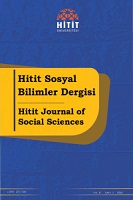DEMOKRASİ DÜZEYİ VE EKONOMİK ÖZGÜRLÜKLER ÜLKE KREDİ NOTLARI ÜZERİNDE ETKİLİ MİDİR? BRICS-T ÜLKELERİ ÜZERİNE BİR UYGULAMA
Do Democracy level and Economic Freedoms Affect a Country’s Credit Ratings? An Application on BRICS-T Countries
Author(s): Gizem Vergili, Mehmet Sinan ÇELİKSubject(s): National Economy, Economic policy, Political economy, Politics and society, Socio-Economic Research
Published by: Hitit Üniversitesi
Keywords: Democracy; economic freedoms; comparative rating index for sovereigns (CRIS); credit rating agencies; BRICS-T;
Summary/Abstract: Apart from many macroeconomic and financial factors that affect sovereign credit ratings, it is thought that factors such as the level of democracy and economic freedoms may also have an impact. The study was carried out to determine whether the level of democracy and economic freedoms affect the sovereign credit ratings given by credit rating agencies in BRICS-T (Brazil, Russia, India, China, South Africa and Türkiye) countries. For this purpose, the grades given to the BRICS-T countries by Moody's, Standard & Poor's and Fitch, which are called “The Big Three Credit Rating Agencies” that control almost the entire market as the dependent variable, have been digitized with the “Comparative Rating Index for Sovereigns” (CRIS) and taken as an arithmetic average. “Democracy Quality” and “Economic Freedom Index”, which are frequently used in the literature, were used to represent the level of democracy and economic freedoms and “Economic Growth”, “Inflation”, and “Reserves” as control variables. In the study in which Panel Data Analysis was used, the "fixed effects model" was applied due to the tests for selecting the appropriate model. As a result of the analysis, it was determined that all the independent variables had a statistically significant positive effect on the sovereign credit ratings except inflation.
Journal: Hitit Sosyal Bilimler Dergisi
- Issue Year: 15/2022
- Issue No: 2
- Page Range: 581-595
- Page Count: 15
- Language: Turkish

